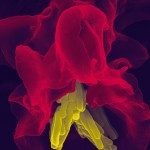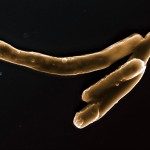Link to Pubmed [PMID] – 12488500
J. Leukoc. Biol. 2002 Dec;72(6):1180-9
That monocytes can differentiate into macrophages or dendritic cells (DCs) makes them an essential link between innate and adaptive immunity. However, little is known about how interactions with pathogens or T cells influence monocyte engagement toward DCs. We approached this point in cultures where granulocyte macrophage-colony stimulating factor (GM-CSF) and interleukin (IL)-4 induced monocytes to differentiate into immature DCs. Activating monocytes with soluble CD40 ligand (CD40L) led to accelerated differentiation toward mature CD83(+) DCs with up-regulated human leukocyte antigen-DR, costimulatory molecules and CD116 (GM-CSF receptor), and down-regulation of molecules involved in antigen capture. Monocytes primed by phagocytosis of antibody-opsonized, killed Escherichia coli differentiated into DCs with an immature phenotype, whereas Zymosan priming yielded active DCs with an intermediate phenotype. Accordingly, DCs obtained from cultures with CD40L or after Zymosan priming had a decreased capacity to endocytose dextran, but only DCs cultured with CD40L had increased capacity to stimulate allogeneic T cells. DCs obtained after E. coli or Zymosan priming of monocytes produced high levels of proinflammatory tumor necrosis factor alpha and IL-6 as well as of regulatory IL-10, but they produced IL-12p70 only after secondary CD40 ligation. Thus, CD40 ligation on monocytes accelerates the maturation of DCs in the presence of GM-CSF/IL-4, whereas phagocytosis of different microorganisms does not alter and even facilitates their potential to differentiate into immature or active DCs, the maturation of which can be completed upon CD40 ligation. In vivo, such differences may correspond to DCs with different trafficking and T helper cell-stimulating capacities that could differently affect induction of adaptive immune responses to infections.


